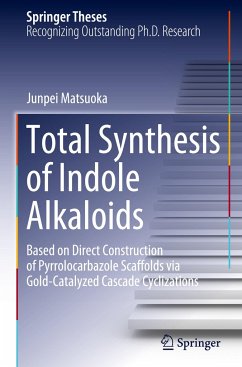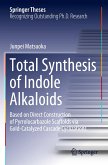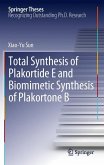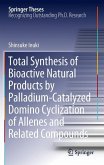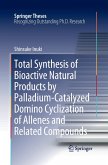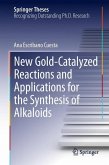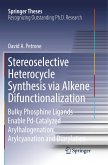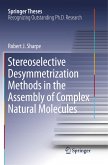This book explores efficient syntheses of indole alkaloids based on gold-catalyzed cascade cyclizations, presenting two strategies for total synthesis of these natural products based on gold-catalyzed reactions of conjugated diyne or ynamide.
The book first describes the total and formal synthesis of dictyodendrins A-F based on direct construction of the pyrrolo[2,3-c]carbazole core using the gold-catalyzed annulation of azido-diynes and protected pyrrole. This synthetic strategy features late-stage functionalization of the pyrrolo[2,3-c]carbazole scaffold at several positions and allows diverse access to dictyodendrins and their derivatives. Secondly, the book discusses the formal synthesis of vindorosine based on the pyrrolo[2,3-d]carbazole construction using the gold-catalyzed cascade cyclization of ynamide. Importantly, the reaction using a chiral gold complex provides the optically active pyrrolo[2,3-d]carbazole. This strategy facilitates the rapid construction of the pyrrolocarbazole core structure of aspidosperma and related alkaloids, including vindorosine.
These methodologies can accelerate the medicinal application of pyrrolocarbazole-type alkaloids and related compounds.
The book first describes the total and formal synthesis of dictyodendrins A-F based on direct construction of the pyrrolo[2,3-c]carbazole core using the gold-catalyzed annulation of azido-diynes and protected pyrrole. This synthetic strategy features late-stage functionalization of the pyrrolo[2,3-c]carbazole scaffold at several positions and allows diverse access to dictyodendrins and their derivatives. Secondly, the book discusses the formal synthesis of vindorosine based on the pyrrolo[2,3-d]carbazole construction using the gold-catalyzed cascade cyclization of ynamide. Importantly, the reaction using a chiral gold complex provides the optically active pyrrolo[2,3-d]carbazole. This strategy facilitates the rapid construction of the pyrrolocarbazole core structure of aspidosperma and related alkaloids, including vindorosine.
These methodologies can accelerate the medicinal application of pyrrolocarbazole-type alkaloids and related compounds.

